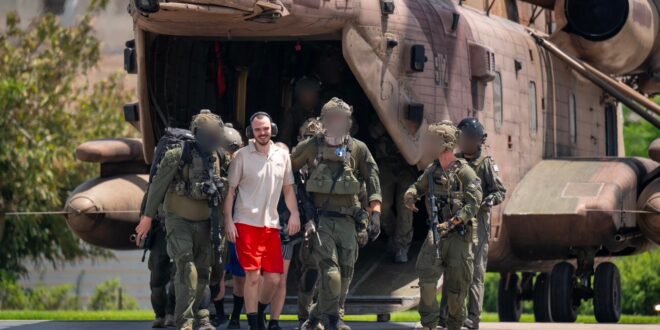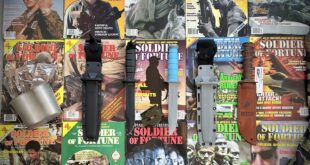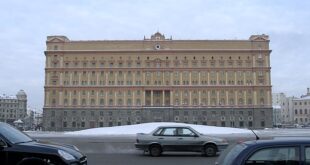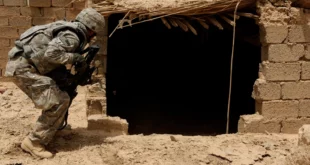Israeli commandos rescued Andrey Kozlov and three other hostages in the daring “Operation Arnon.”
by Elon Perry
The interview with Andrey Kozlov was not going well.
I had asked him, early on, to talk about his time in captivity. The conversation appeared to have stalled already. His answers mostly came in monosyllables. Just one sentence was thrown in: “We experienced shocking, inhumane things, some of which I cannot share because of shame.”
But when I asked about his background, his family in Russia and his new girlfriend, the 27-year-old started to open up. He began to laugh and smile – and then to reveal chilling details of his treatment in captivity, which he had previously only told his debriefers.
Kozlov reportedly emigrated from St Petersburg to Israel about two years ago, initially by himself. His parents and his brother decided to stay in Russia due to work constraints and personal commitments.
Once in Israel, he struggled financially. Despite being a clever and healthy young man, he was unable to work since he did not speak Hebrew.
Left with no choice, he worked as a security guard in stores and malls, where not speaking Hebrew was not an issue. When the organisers of the Nova festival were looking for security guards, he applied and was accepted.
“When the shooting began,” Kozlov recalled, “the music stopped and everyone began looking for ways to flee the burning field. I also started running to the open, looking for the kibbutz’s entrance, but I was met by a swarm of armed terrorists who fired at us non-stop.
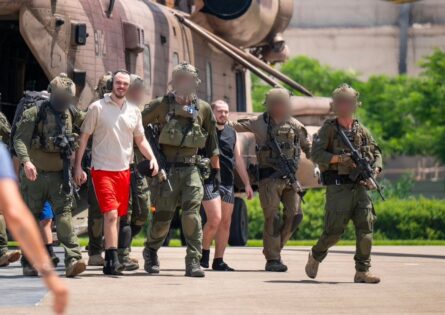
“Then I leaped into a ditch, and another Israeli jumped after me, who subsequently turned out to be Shlomi Ziv, one of the men I would be in captivity with in the future. But then, when I was sure that I was safe, two armed men forcibly pulled me from the ditch and within seconds I found myself in a green van, which looked like a military vehicle, with Shlomi and a few others, including two young girls.
“I was certain that the Israeli army had arrived to save us from the raging inferno – I had no idea I was being kidnapped. We drove for six or seven tense minutes before I realised the van was heading west, towards Gaza, rather than Israel. Then I recognised that the bearded man seated behind us, wearing a green bandana and clutching a Kalashnikov rifle, was not an Israeli soldier who had come to our rescue but a Hamas terrorist with hostile intentions.
“By the way, something funny happened during that creepy ride. The terrorist ordered Shlomi to drive the vehicle – something that became a joke in the ensuing days of captivity, both among us abductees and among the terrorists. It turned out that this young terrorist did not possess a driver’s licence.”
After a loud, rumbling laugh, Kozlov continued.
“When we drove through the breached wall on the border with Gaza, we witnessed fields full of Gazans, some on bicycles, some on donkeys, all dancing with delight. Their excitement was unbridled and barbarous. I remember the face of one of them in particular. He looked like a predatory animal, his eyes wide open, filled with malice. Some of them attempted to get into our car. We covered our faces with our hands. Shlomi was driving rapidly and nearly ran over some Gazans.
“After a tense drive that felt like a scene from an action film, the car stopped somewhere on the outskirts of Gaza [city]. We were all ordered to get out of the vehicle, while being pushed violently into a residential building. Then six armed guys took us to the second floor of a building and forced us into one of the apartments, where our hands were bound behind our backs.
“Horrified and shocked, we sat on the chilly floor, and I’m trying to figure out how to tell the kidnappers that I’m a Russian citizen, and that they got the wrong person.” I asked what went through Kozlov’s head in the first few moments of being tied up and lying on the floor. “I recall thinking one thing: I have to survive this. I attempted to distract myself with other thoughts, like it’s only a movie or a dream.
“I had numerous mantras that I repeated to myself in Russian: I am still alive, every day is a gift, my family is waiting for me to come back alive.
“I kept saying to myself that I must return to my family, while reciting the advice from Holocaust survivor Viktor Frankl’s book: ‘If you have something to live for, like a loving family, or some work to finish, then you can survive anything.’”
Kozlov was eventually rescued along with Almog Meir Jan, 21, and Shlomi Ziv, 40, (the other hostage rescued in the raid – Noa Argamani – was being kept in a separate building a few streets away.)
The place where he was first taken after his abduction was a Palestinian family’s home divided in two by blankets and dark curtains.
One half was used for the captives and their armed Hamas guards, and the other was occupied by the family who lived there. They had been instructed to avoid any contact with the abductees.
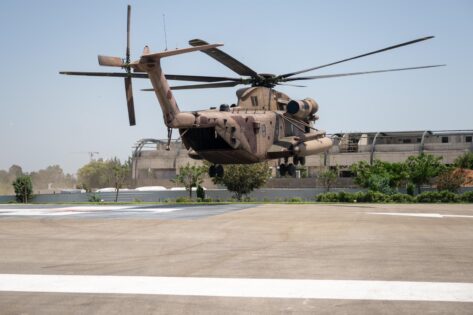
The rescue helicopter
“We were held in a dark flat with hermetically closed windows. I couldn’t see anything, and I wasn’t sure if it was day or night.
“For two months, our hands were tied behind our backs, and our legs were shackled with rusty chains that hurt terribly and made it difficult to sit or lie down.
“We were forced to defecate in front of the terrorists who mocked and laughed at us, telling us that Israel had forgotten about us and that we would never be free.
“They forced us to study the Koran every day. They beat us five or six times a day, for no reason.
“In those moments, images flashed through my mind from stories I had read about sadistic guards who abused prisoners to satisfy their morbid lust. One time I needed to pee, but they wouldn’t allow me. Only after two days did they take me to the restroom.
“Previously, they just placed an empty bottle in front of me and instructed me to urinate into it while my hands were tied behind my back.
“When they discovered I was struggling, they dragged me to the bathroom, leashed like a dog, while shouting ‘go-go-go’. I said that I needed to take my pants off but my hands were tied.
“They laughed and continued to drag me with the rope while chanting ‘go-go-go’. It was humiliating. I was totally helpless.”
After a short silence, while he sipped water from a glass, Kozlov continued with a bitter smile on his face.
“After the Israeli bombardment intensified, they scattered us all to different locations.
“I found myself on a dusty floor littered with construction materials.
“They secured the room, turned off the light and left me alone with my hands tied behind my back for the night.
“There were no blankets or pillows, only a dust-covered floor. I have a dust allergy so I couldn’t sleep.
“After two weeks, I was transferred to another floor, along with numerous other abductees from other floors of the building.
“Only after my eyes weren’t veiled did I realise that we were in a construction site.”
Do you remember how long you were held in that construction site? I asked.
“I think it was just four or five days before we were moved again. Because of the incessant bombing, the terrorists began to panic.
“I overheard exchanges of shouts in Arabic between them.
“Suddenly, they began violently shoving us out and then loaded us into vans. After a tense, terrifying ride with bombs dropping close next to us, the van I was in came to a stop and I was pushed into a building.
“I didn’t know what happened to the other abductees or where they were taken.
“From then on, I was moved almost every day from apartment to apartment, from tunnel to tunnel, while shackled in both my hands and feet, and with my eyes covered.
“After about two months of indescribable suffering, I was transferred to an apartment in the Nuseirat neighbourhood, where I met two Israeli abductees.”
These abductees were Almog Meir Jan and Shlomi Ziv.
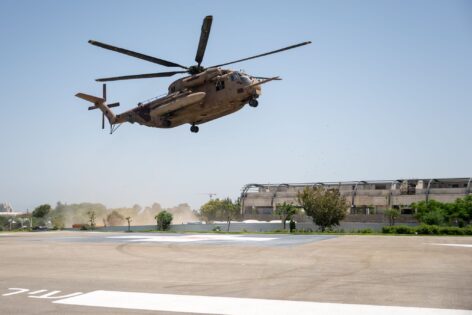
The flight to freedom.
What was the worst place you were kept in?
“There were different conditions and different people anywhere I was kept.
“I am unable to rate them as they were all very bad, difficult to survive, experiences that leave you with deep scars.
“However, I remember one place in particular that was different.
“It was one of the apartments I was transferred to.
“There was a young armed guard who brought a deck of cards and played with me, and from time to time he would let me watch the news on TV.
“That’s how I realised that the situation was horrible and there were hundreds of dead and many hostages.”
How about the place from which you were successfully rescued, was it any better?
“The conditions were seemingly better.
“Our hands and feet were no longer chained; we were not hit often, as before; we didn’t have to ask for permission to go to the bathroom. Unlike the previous places, where the guards wore masks so that we wouldn’t recognise them, here they walked around freely with no mask. But they wouldn’t tell us their names. They all introduced themselves as ‘Mohammed’. So we had to give them names: the tall Mohammed, the dark Mohammed, the big-eyed Mohammed, the short Mohammed.” Kozlov laughed as he recalled this.
The improvement in conditions meant the feelings of utter despair and fear eased.
“However, the feeling of being locked up, with no release date as inmates in civilian prisons have, was oppressive.
“What helped me keep sane and active was Shlomi and Almog, with whom I spent many months in one small room.
“They taught me Hebrew and I taught them Russian.
“At some point the kidnappers brought us sheets of paper on which we formulated trivia questions and crossword puzzles. Sometimes I did some drawings but was unable to take them with me when the heroic Israeli angels burst into the room through the window – a complete surprise.
“I managed to learn Hebrew fast and at a level I never dreamed of. Ironically, as a captive who needed something to pass the time with, I had a rare opportunity not only to learn the language every day, ten hours a day, but also to practise it with two Hebrew speakers, my friends Almog and Shlomi.”
Kozlov burst out laughing again. “I’m not sure I could have learned Hebrew in my usual everyday routine as a free person.”
Elon Perry is a journalist and former commando in the Golani Brigade of the IDF. He is the author of Children in War: A First-Hand Account of the Israeli-Palestinian Conflict.
 Soldier of Fortune Magazine The Journal of Professional Adventurers
Soldier of Fortune Magazine The Journal of Professional Adventurers


